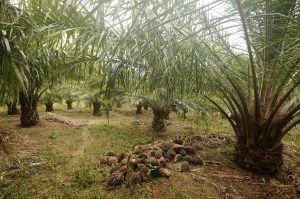Naga Republic Feature| March 29, 2023
Against the backdrop of public concerns in Nagaland over imposition of municipal tax on land and buildings and the widespread fear that such policies contravene the special provisions under Article 371 (A), now comes a report on the threat posed by oil palm plantations in Northeast India and how indigenous communities face risk to their land rights, climate, ecology and culture.

An oil palm plantation in Mizoram. Photo: TR Shankar Raman/Wikimedia Commons
The priority regions earmarked for oil palm expansion are the Northeast Indian states and the Andaman and Nicobar Islands, states a report prepared by Rupa Chinai and Ravi Chellam. According to the authors, both these regions together encompass three Global Biodiversity Hotspots, host a multitude of species that are globally threatened, range-restricted or endemic, and continue to retain some of the most extensive tracts of forest in India.
The report titled ‘Expansion of Oil Palm plantations in Northeast India: a disaster in the making’ has been prepared to educate and create awareness for community leaders and the media in Northeast India. The report points out that the targeted forest lands for oil palm plantation “are crucial for biodiversity, climate resilience and protecting the interests of indigenous cultures, their lifestyles and livelihoods”.
“Because of their ecological and cultural significance, both these regions should be No-Go areas for oil palm cultivation”, the report strongly argues.
It may be mentioned that among others, Article 371 (A) specifically guarantees to the people of Nagaland, rights over ownership and transfer of land and its resources.

The government of Nagaland and Patanjali Foods Ltd signed a memorandum of understanding for oil palm plantations in the state under the National Mission on Edible Oil – Oil Palm (NMEO-OP)
Interestingly the report cautions that oil palm cultivation tends to “shift land tenure from community-owned to privately held” and that the power of Gram Panchayats and other village-level and community-based councils to manage their own lands will pass to companies. “In effect, land will become “locked” under oil palm, and communities will then have no say in land management”.
This according to the report is a “uniquely Northeast Indian problem, where due to special constitutional protections under the 6th Schedule or Article 371 series, land ownership and management are primarily in the hands of the community, with the strength of protective provisions varying in different states”. This is unlike the rest of India where land is owned privately or by the government, the report points out.
“Land tenure moving into private hands has already happened in Indonesia, Malaysia, Papua New Guinea and in a few peninsular Indian states, where tribal communities have lost their lands, and people have no choice but to work as labourers on oil palm plantations in their own land”, the report further warns.
IF the points mentioned in the report are indeed valid, it clearly exposes the Government of India’s “push for vegetable oil security”. The report mentions that under the ambitious National Mission on Edible Oil–Oil Palm (NMEO-OP), the Centre aims to place an additional 1.32 million hectares of land under oil palm cultivation in India by 2030. This according to the report is an area that is larger than the entire state of Tripura.
The report largely uses the experience with oil palm cultivation in Mizoram and describing it as “disastrous”. It claims that oil palm plantations have left the soil infertile and alarmingly depleted the water resources. “Infrastructure for transportation and milling is non-existent, and the crop is left to rot either on the tree or on the ground after harvest. Farmers have made zero profits from oil palm, and efforts to replace oil palm with other crops have failed because of depleted soil nutrients and decreasing water availability”.
According to the report the three companies involved with oil palm cultivation in Mizoram; Godrej, 3F, and Ruchi Soya (the last now owned by Patanjali), have faced no accountability for the failure of the crop in the state. It was also pointed out that in Nagaland, farmers are wary of cultivating oil palm because of grossly inadequate water supply, loss of crop to rodents and the lack of buyers for produce, despite government assurances.
As demonstrated by the Mizoram experience, the report states that no state in Northeast India should opt for oil palm plantations as a source of revenue or horticultural development.
Note: Main photo used is courtesy: Ardiles Rante/Greenpeace
Read full report: Expansion of Oil Palm plantations in Northeast India: a disaster in the making







 An orbiting message of peace
An orbiting message of peace What Does Your Face Say About Your Health?
What Does Your Face Say About Your Health? The Top Viral YouTube Videos of 2017
The Top Viral YouTube Videos of 2017 Meet R.N. Ravi, who is mediating peace with the Nagas
Meet R.N. Ravi, who is mediating peace with the Nagas










Leave a Reply
Your email address will not be published. Required fields are marked (required)